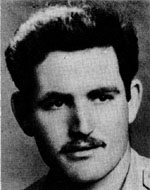Son of Zeev and Dvora. Born on 11.6.1937 in Herzlia, because the parents were both workmen, the boy was forced to learn how to become independent soon, and when Yohanan was in elementary school, he attended elementary school in Herzliya and completed his studies there. After graduating from elementary school, he studied for one year at the “Max Payne” vocational school in Tel Aviv, but later joined the educational institution of Kibbutz Beit Hashita, where he graduated from high school. He was a good student, a responsible boy, a diligent employee and a favorite of everything, an older man with a spirit of friends and serious by nature, but despite his maturity and seriousness he had a healthy sense of humor And a smile always hung on his lips to every person he met At that time she stayed at Beit Hashita, a youth company that Yochanan treated with her guidance, and also displayed talent and responsibility, and his pupils loved and admired him. When he finished school, Yochanan was accepted as a member of the Beit Hashita school and in October 1955 he was drafted into the IDF and was part of the Golani Brigade’s reconnaissance unit. Shortly before the Sinai Campaign, when the AMX tanks were received in the country, outstanding soldiers were selected from all units to take a course of tank commanders, Yochanan was one of them since then until they fell. Before he turned 20 he took a wife – and he is still in regular service – and at the age of 26 he was already the father of three children. After being released from regular service in 1958, he returned to Beit Hashita; In the farm he worked in the barn and despite his youth he was responsible for most of the work there, but after a year he left, for personal reasons, with the family and settled in Kiryat Motzkin. At first he worked as a tractor operator, later in Solel Boneh, but his desire for independence gave him no rest. He went to work in a “sand group” hoping to move forward in life and later moved to a private contractor to work there. In the framework of his work he worked everywhere: in the north in the national water carrier, in the phosphate factories in the south – and on all the roads in the country. Despite his hard work, to support a large family, there was never any complaint in his mouth. He was a loyal husband and devoted father to his children and in the few leisure hours he had had the knowledge to entertain and guide them, and undoubtedly gave them many values that would serve them when they were great. John liked to travel; Yes he loved the sea. He was very fond of listening to classical music. He did not like the war, and in his good Lev he opposed any violence, because life was sacred to him. The Arabs, too, had no attitude of hatred and worked with them in the framework of his work; More than once they were of the opinion that their living conditions should be improved. He also hoped that a day would come when peace would be between the Arab people and us. However, despite his views and views, when called to reserve duty before the Six-Day War and he realized that there was a need to fight effectively, he emerged without hesitation. In his letters to the period before the war he wrote that “great tension, but better a year of tension than shooting one bullet and one victim.” At the outbreak of the war, Yohanan was in the north, and in a letter that came after him, he wrote: “Here we are relatively safe, we have a platform to defend ourselves and what to attack the enemy, but you only have to go down to the shelter. But the next day the battalion was transferred to the Jordanian front. His battalion participated in the battle for Jenin, conquered Tobas and advanced into Nablus. On the western outskirts of Nablus, the tank division, with Yochanan as its symbol, boarded an ambush by a Jordanian battalion of infantrymen and within a few minutes hit several of them. In this battle Yohanan was hit directly; The gunner and the driver managed to jump out but not John, who died insideThe tank; It was on the third day of the war, which was on the 28th of Iyar 5727 (7.6.1967). He left a wife, two daughters and a son. He was buried in the military cemetery in Afula and later transferred to the eternal rest of the cemetery in Herzliya. His memory was mentioned in a booklet issued by the Kiryat Motzkin local council in memory of the fallen boys.
